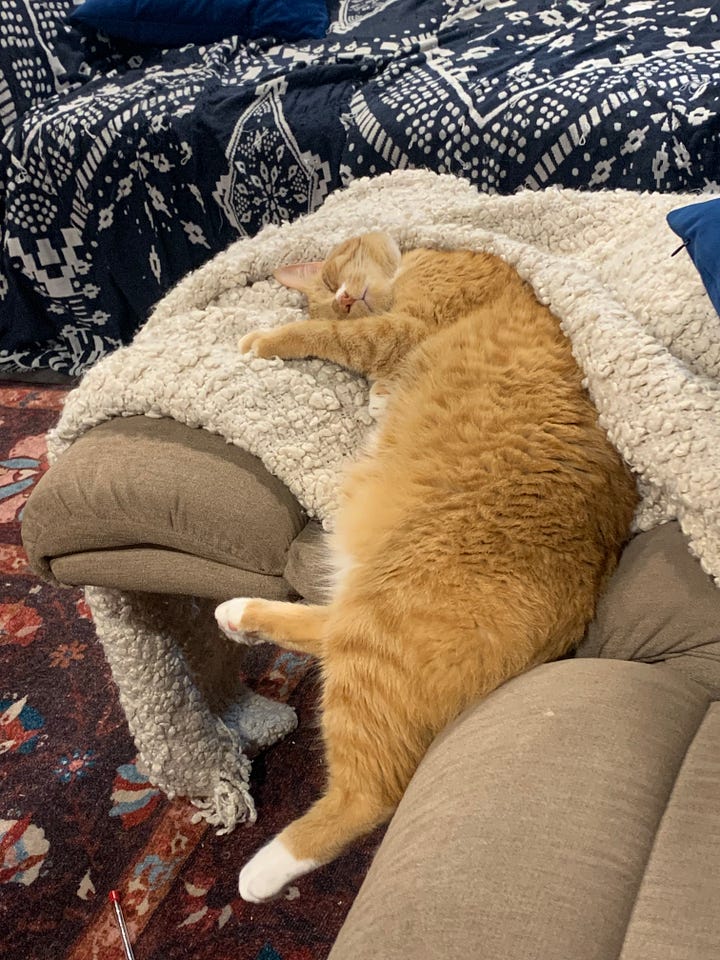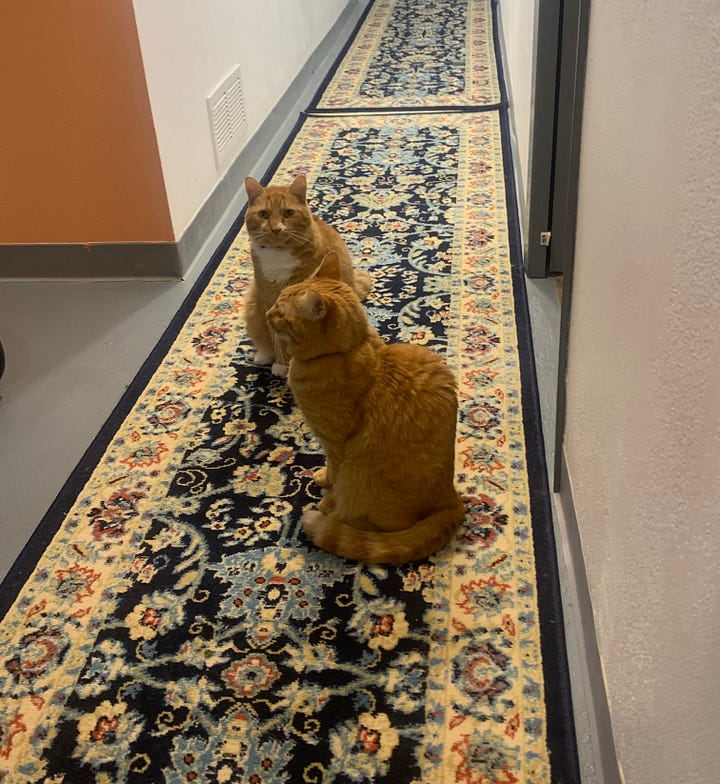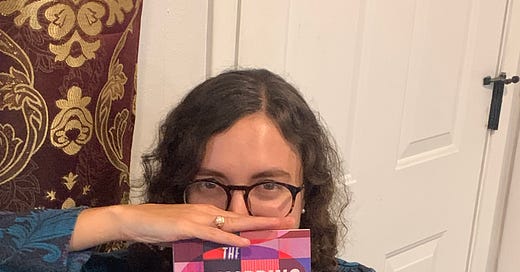I’ve never seen the movie It’s A Wonderful Life, but I’ve read the Wikipedia summary, a couple reviews, and a half-dozen Reddit fan theories. Despite this lack of firsthand knowledge, I recently wrote and published a story about a musical adaptation of the movie—which I haven’t seen either—for my local paper.1
Screetch scratch, how did I get here?
I am not a reporter. I don’t see many plays. I reached out this paper because I wanted to interview a completely unrelated author about a completely unrelated book and the paper editor said no thanks, but real quick, can you write about this musical? And I said sure, why not. But shouldn’t I see the play first? Or at least a rehearsal? She said no, but you can interview the artistic director. I said okay. So I interviewed him and wrote it up and sent my draft to the editor—her name is Linda—and then dashed off to see the Barber of Seville opera with my mom and stepdad at the local performing arts center. You know, the opera where Bugs Bunny rubs hair grease into Elmer Fudd’s squishy bald skull while another bald guy belts out Fiiii-gaaa-roooo. It turns out the main tune from Bugs Bunny—duh-duh-duh-DUH-duh, duh-duh-duh-DUH-duh—isn’t in the opera itself, just the overture the orchestra plays before the story kicks off. Despite this disappointment, I found the whole thing fun and, furthermore, moving. Maybe I drifted to sleep briefly in the first act but I woke up in time for its finale, just before intermission, during which, after much subterfuge involving fake identities, everyone sings about how confused they are, how chaotic everything is, how interminably loud and obnoxious it is. They repeat this over and over: everything is loud, everything’s confusing, nothing makes sense anymore. I cried very much during this, overwhelmed at how happy this made me. I always cry at the wrong time. In plays and movies, I cry not from sadness but from joy and/or awe. In life, I only ever cry in private or in the arms of my patient husband. Sometimes I wish I could grieve in the open but I can’t. It just doesn’t work. But sing me a song about joyful chaos on the road to love? Here’s a bucket full of tears.
One of the silly things you dream about as a writer is what it will feel like to hold your own book for the very first time. The joy, the tears, all of the feelings you have ever felt about writing, love for the characters, victory over self-doubt: In a perfect world, all of this would come together when you opened the box and saw the cover in physical reality, and the emotions would be strong enough to split a body open. Maybe you’ve seen the unboxing videos of authors screaming their heads off or weeping themselves dry.2 I sometimes wondered what my own video would look like. I decided I must come up with some sort of plan to make it interesting. How? Figure it out later. Either way, what better way to showcase the joy and effort that’s gone into something so chaotic and extraordinary as publishing a novel?
In actuality, I found my advanced reader copy in the mailbox right after a dreary walk in the cold rain during which multiple cars sprayed me with standing water. I was wearing ugly jeans and hadn’t washed my hair and didn’t feel like taking off my hulking rain boots despite my pants being soaked and I had no plan. All I could do was sit down where I stood. And yet despite the circumstances, I told Seth to film me. Because why not? Whatever it was, it was real.
The result was… awkward. I’d call it happy, a little silly, but not moving or emotional. Nothing worth sharing with the world at large.
(Although I did so anyway, here).
It’s been a busy month, which is nice: I thrive on busy. I set a deadline for myself to finish a draft of a new novel by the end of year; at the same time I’ve had to work long hours at the day job thanks to back-to-back international climate conferences, all while I’ve been pitching interviews to various outlets that have been accepted,3 proofreading the Unmapping, and also starting to study music theory. Between work and freelancing I’ve been emailing so many Lindas I can’t keep them straight.
And I’m playing cello again, every day I can. Last month, I performed in my first orchestra concert in sixteen years. We played the Dvorak New World Symphony, which is a marvelous piece. Guess what, during rehearsals, I cried. More than once. It was always in the fourth movement near the end. This symphony thrives on chaos, with two different keys and themes that thrash and fight for dominance up until the end. There’s something about the feeling of accomplishment and finality that overwhelmed me when we practiced this ending in rehearsal. The rising feeling that shakes a room. How blessed I felt to be part of this experience that was so much bigger than me. And I couldn’t help but picture what it would be like to play this in front of my friends and family, to share this experience with them—would I be able to hold myself together?
When it came to the concert itself, I was hot and a little nauseous. My eyes remained dry.
This is a unique state of life I’m in. You can only publish a debut novel once. It’s kind of like being engaged to be married. No one ever congratulates me for having a husband. Like, good job! You are boring!4 But when I was engaged, it was exciting, with happy tidings left and right. And the wedding itself. My favorite part of weddings is when the bride walks down the aisle. I cry every time with love. Yet during my own wedding, this exact walk felt surreal and strange. I sort of wanted it to be over. When I got to the end of the aisle, everything was lovely of course, best day of my life yadda yadda; I even choked up when I began reading my vows (after which I felt immediately self-conscious, sucked it up, and spoke with an even voice), but the walk itself, this moment I’d put so much thought into, was bizarre. And then it was over.
It’s impossible to know when I will feel the emotions that move me, drive me. Like water in a tide pool, they leave and come back at will. The best feelings cannot be forced.5 They cannot be directed like actors in a play. The many pieces of my brain that work together like a symphony, sometimes they get a little hot and nauseous and need a rest. And sometimes, miracle upon miracles, it all works together like it’s supposed to. One conductor waves his wand and a musical story, an epic beyond words, beyond time, comes to life. It’s all I can do to hold on.
-Denise
PS: Recommendations for the month:
Having opinions about movies you haven’t seen
Preordering The Unmapping and/or adding it to your Goodreads tbr ;)
Listening to the Dvorak New World Symphony while going on a walk in the rain
The Three-Body Problem by Cixin Liu - I haven’t seen the TV series but this book blew me away. It has action. It has science. It has, underneath it all, a deep meditation on humanity.
Merve Emre (one of my favorite critics) interviews Sally Rooney (one of my favorite authors). Highlight: “Every person is intrinsically interesting, but in a novel, what gives a character power is their relation to others, and how those relations change.”
PPS: Cats falling off couch whilst sleeping, sitting creepily on carpet


The initial piece I wrote about It’s A Wonderful Life is not the one that got published. In my initial version, I wanted to meditate on the idea of what a “classic” is and what it does, why a story can continue to be told as the decades grind on through war, peace, inflation, recession, global warming, the diminishment of religion, and the rise of Taylor Swift. (In those exact words. I was proud of myself for that opening sentence). Part of the answer, I thought, could be chalked up to a secretarial fluke. In 1974, the studio that owned the film forgot to renew its copyright, releasing it into the public domain. This allowed television networks to air it endlessly, royalty-free, until audiences fell in love with the story.
The essay was rejected. I guess it was too unfocused and, even more egregiously, involved my own opinions rather than the bodiless persona of a reporter I was supposed to inhabit. But I am a human with chaotic opinions about a movie I’ve never seen! I wanted to talk about how George Bailey is both stupid (he completely forgets that he has four children when he wishes he’d never been born? He doesn’t think the literal creation of human life is noteworthy?) and heroic (his return to his family and community is sometimes criticized as a pathetic defeat but rather I see it as a quiet victory). But I appreciate the challenge of this form of writing, what it means to remove myself and write more as if I am solving a mystery. Oh, you’re asking how a classic movie stands the test of time? You think it’s something about its nuanced simplicity? What do you have to prove this theory? Vibes? Alas. In another life.
To watch a much much better unboxing video than my own, check out this video from Marines Alvarez, who acquired The Unmapping, the first book in her imprint for Bindery, and who was overwhelmed by the notion that she was publishing something she cared about after years of living and breathing in the world of books. It’s moving and sweet and I love it so much. I might be happier for her than I am for me?
Here’s an interview I somehow forgot to include in last month’s noticement — with Mississippi author Max Hipp, of his simply stunning story collection “What Doesn’t Kill You Breaks Your Heart,” in which we discuss the importance of Taco Bell and finding empathy for characters you don’t agree with (something I find extremely important in this political moment). Read it here.
Necessary caveat that being married is not, in fact, boring, and that stability is often necessary for creativity, but that’s a topic for a different newsletter.
This post is sponsored (spiritually, not fiscally) by this quote from Hartmut Rosa: “The driving cultural force of that form of life we call ‘ modern’ is the idea, the hope and desire, that we can make the world controllable. Yet it is only in encountering the uncontrollable that we really experience the world. Only then do we feel touched, moved, alive. A world that is fully known, in which everything has been planned and mastered, would be a dead world…Our lives unfold as the interplay between what we can control and that which remains outside our control, yet concerns us in some way. Life happens, as it were, on the borderline.”




